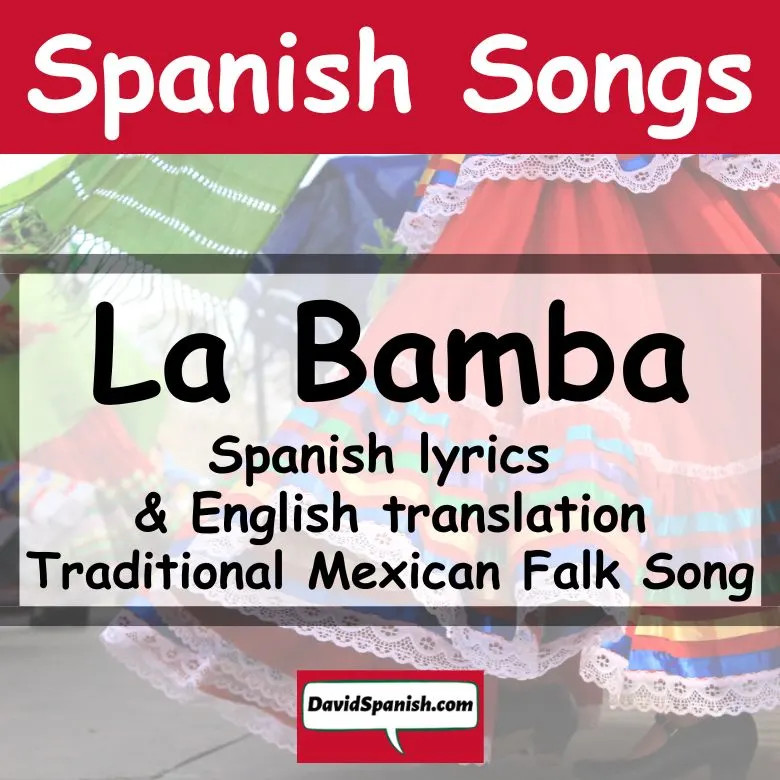“La Bamba” is more than just a catchy tune; it’s a vibrant piece of Mexican cultural heritage that has resonated across generations and borders. Originating as a traditional folk song from Veracruz, Mexico, “La Bamba” has evolved through various interpretations, most famously popularized by Ritchie Valens in 1958 and later by Los Lobos in 1987. This article delves into the words to the song “La Bamba”, exploring the Spanish lyrics, their English translation, and the deeper meaning behind this iconic song.
Decoding the Lyrics of La Bamba
The lyrics of “La Bamba” are relatively simple, yet rich in cultural nuance. Let’s break down the key phrases to understand their meaning and significance.
Para bailar La Bamba
This opening line, repeated throughout the song, translates directly to “To dance La Bamba.” The word “bamba” itself is a feminine noun in Spanish meaning “the beat.” It’s linked to the verb “bambolear,” which evokes movements of swaying, wobbling, or tottering. Therefore, “La Bamba” in this context refers to the rhythm and the dance itself. Another interpretation of “para” could be “in order to,” giving us “In order to dance La Bamba.”
Se necesita una poca de gracia
This line translates to “You need a little grace.” The Spanish verb “necesitar” means “to need.” The reflexive form “necesitarse” means “is needed,” so “se necesita” can be understood as “you need” or “one needs.” “Un poco de gracia” means “a little grace” or “some grace,” with “gracia” referring to flair, charm, or ease. This line suggests that dancing La Bamba requires a certain amount of finesse and elegance.
Pa’ mí, pa’ ti
This is a shortened version of “para mí, para ti,” meaning “for me, for you.” This simple phrase speaks to the shared experience of the dance, inviting everyone to participate and connect through the rhythm of La Bamba.
Ay arriba, y arriba
These words are energetic and encourage movement. “Arriba” in Spanish translates to “up” or “above.” However, as an interjection, “¡arriba!” is used as a cheer or encouragement, similar to “come on!” in English. This line injects dynamism into the song, urging dancers to lift their spirits and move with enthusiasm.
Y arriba, y arriba
Repeating “Y arriba, y arriba” reinforces the energetic call to action, further enhancing the lively and upbeat nature of the song.
Por ti seré, por ti seré, por ti seré
This line translates to “For you I will be.” “Seré” is the first-person singular future tense conjugation of the verb “ser” (to be). This phrase expresses devotion and commitment, adding a layer of romantic undertones to the song. It suggests that the singer is willing to be someone special “for you,” possibly in the context of the dance or a deeper personal relationship.
Yo no soy marinero, soy capitán
These lines offer a contrast and a playful boast. “Yo no soy marinero” means “I am not a sailor,” while “soy capitán” means “I am the captain.” This could be interpreted metaphorically, suggesting that while the singer might not be a traditional “marinero” (sailor), perhaps representing someone skilled in traditional dances or courtship, they are confident and in charge (“capitán”) in their own way, especially in the context of La Bamba.
La Bamba Lyrics: Spanish to English
Here are the complete lyrics of “La Bamba” with a line-by-line English translation for better understanding:
| Spanish Lyrics | English Translation |
|---|---|
| Para bailar La Bamba | To dance La Bamba |
| Para bailar La Bamba | To dance La Bamba |
| Se necesita una poca de gracia | You need a little grace |
| Una poca de gracia | A little grace |
| Pa’ mí, pa’ ti, ay arriba, ay arriba | For me, for you, ah come on! ah come on! |
| Y arriba, y arriba | And come on! come on! |
| Por ti seré, por ti seré, por ti seré | For you I will be, for you I will be, for you I will be |
Yo no soy marinero | I am not a sailor
Yo no soy marinero, soy capitán | I am not a sailor, I’m (the) captain
Soy capitán, soy capitán | I’m the captain, I’m the captain
Bamba, bamba | Beat, beat
Bamba, bamba | Beat, beat
Bamba, bamba, bam | Beat, beat, beat
Para bailar La Bamba | To dance La Bamba
Para bailar La Bamba | To dance La Bamba
Se necesita una poca de gracia | You need a little grace
Una poca de gracia | A little grace
Pa’ mí, pa’ ti, ay arriba, ay arriba | For me, for you, ah come on! ah come on!
Para bailar La Bamba | To dance La Bamba
Para bailar La Bamba | To dance La Bamba
Se necesita una poca de gracia | You need a little grace
Una poca de gracia | A little grace
Pa’ mí, pa’ ti, ay arriba, ay arriba | For me, for you, ah come on! ah come on!
Y arriba, y arriba | And come on! come on!
Por ti seré, por ti seré, por ti seré | For you I will be, for you I will be, for you I will be
Bamba, bamba | Beat, beat
Bamba, bamba | Beat, beat
Bamba, bamba | Beat, beat
 La Bamba folk dance, traditional Mexican music performance
La Bamba folk dance, traditional Mexican music performance
The Enduring Appeal of La Bamba
“La Bamba”’s simple yet evocative lyrics, combined with its infectious rhythm, are key to its lasting popularity. The song is an invitation to dance, to share, and to express oneself with “grace” and enthusiasm. Its cross-cultural appeal is undeniable, evidenced by the success of Ritchie Valens’ rock and roll adaptation, which introduced the song to a global audience, and Los Lobos’ revival, which further cemented its place in popular culture. Whether you’re drawn to its Spanish lyrics, its rhythmic beat, or its cultural significance, “La Bamba” continues to be a song that brings people together and celebrates the joy of music and dance.


